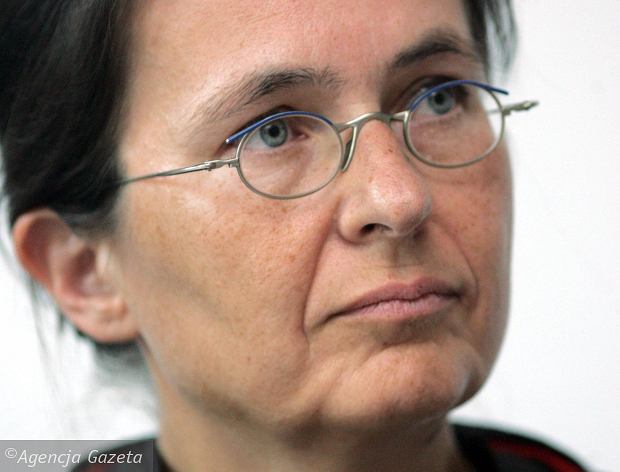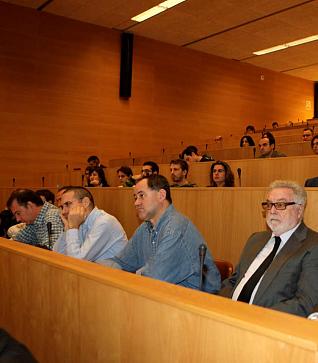JOANNA TOKARSKABAKIR MAY 5 2017 | 2355 CONSCIENCE OF
60 REDAKCJA JACEK GUDOWSKI MACIEJ MACHOWSKI WSPÓŁPRACA JOANNA BUCHALSKAANETA BOŁDYREW JOANNA SOSNOWSKA WYDZIAŁ NAUK O WYCHOWANIU UNIWERSYTET
ARTICLES BY TIME PERIOD 12TH CENTURY VOL 332 JOANNA
CHAPTER 1 WEATHER RISK MANAGEMENT FOR AGRICULTURE BY JOANNA
CURRICULUM VITAE JOANNA BURGER DISTINGUISHED PROFESSOR OF BIOLOGY DIVISION
DEVELOPED BY JOANNA KLAPPERICH AND BSS STAFF DEVELOPED FOR

Joanna Tokarska-Bakir
May 5, 2017 | 23:55
Conscience of the village Klimontow
Andrzej Nowak-Arczewskiego, author of "Have mercy on us", introduces the village of Klimontow:
"A town in Poland. The murder of its Jewish people. A mystery, which to this day is unknown. What happens to the people who close out the outside world?"
Before the war 2 thousand Jews lived in Klimontow. After the deportation in 1942, their Polish neighbors took over 125 of their homes. They took over all the mills on the river Koprzywiance, not to mention orchards, a brewery and a sawmill. But when the war ended, the Jews returned – more or less one percent of them. Their stay did not last long, for on April 16, 1945, six of them were killed at a home on Sandomierz street.
Immediately afterwards, the claim was made that these Jews were killed for collaborating with the NKVD (Communist secret police). What really happened was revealed to me in an eyewitness testimony that I found in the archives of the IPN (Polish Institute of National Remembrance, which prosecuted war crimes against the Polish nation).
"Gotlib Chil came and testified that on the night of 16-17 April 1945 the town of Klimontow was surrounded by armed troops in a force of around 100 people. These troops searched the town for the purpose of finding Jews.
They went to the apartment where Złotnicki Abram, Lederman Chil, Lederman Shmuel and Gotlib Chil were located... They stormed into the room, knocking out the glass. Lederman Chil fled to the roof, where he was shot, while Lederman Shmuel was shot in a room. I managed to jump into the hideout and escape alive. I noticed that among the attackers was Nowakowski Zenek, Karwacki Kazik, Przybylski Joseph, Przybylski Tadeusz Gadulski, Vladek, Tom Kilarski, Witaszek Jan, Smaguła, son-in-law of Kilarskiego and Bara Dzidek ".
The second protocol is cataloged as the testimony of Wolf Fajntuch, whose father had a house on the market, together with Mosziek Zylberberg, the owner of a house at Bits and Ossolińskiej:
"A few days before this act took place, Joseph Batorski of Opatów came to Klimontow, broke into the Lederman home and threatened to kill Abram Złotnicki, declaring at the same time that they give him their money for they would not live, and expressed that the democratic Polish would not be here. He stated that he worked in security and showed them his weapon. Batorski stayed in Klimontow from that time up to the murder.
The citizens Bara Dzidek together with his brother Kaniowskim and Skórskim from K. robbed Złotnicki and severely beat him. Kilarski Tom of K. beat him severerly.
Citizen Kac Pesli came to Tom Kilarski, who lived in Nasławice outside Klimontow, and asked him to return her closet. He declared that he would not return the closet voluntarily, and "if you go to the police, the closets will be of no use to you because you will not live to use them.”
The gang also stormed into the house where Chaim Pęczyna and his pregnant wife Rywka were staying and killed Rywka at the doorstep, killing Chaim in the apartment.
As a result of the prevailing atmosphere, the rest of the Jews, numbering 26, fled the town and the surrounding villages with no roof over their heads and no source of livelihood ".
The murder in Klimontow sparked widespread outrage. Even Bolesław Bierut (President of Poland after the war) mentioned it the next day at a press conference in Moscow. However, the authorities soon ceased to be interested in it.
Only Joseph Batorski, nicknamed "Walnut", who was a kind of hoodlum, was sentenced to the death penalty. The remaining perpetrators, nicknamed "Snatcher", "Strongman", "Trunk" and "Toast," were acquitted and used by the Communists as secret informers, informing the UB about the whereabouts of the old peasant battalions. Some became heads of the agricultural and communal cooperatives.
After the assault, all the Jews, with the exception of Tobcia Stecki who married a Pole, moved out of the town. The Polish residents of Klimontow were now safely alone in their abandoned homes. Nowak-Arczewski’s book talks about what happened once they locked the doors behind them.
What he describes recalls the reportage of Wiesław Luka in his book, "Do Not Bear Witness". Similar is the conspiracy of silence, both of the offenders and the witnesses. On Christmas eve 1976, 30 passengers on a bus from Połańcu witnessed from their window the murder of a pregnant woman, her husband and teenage brother in the village of Zrebin. The killers made the witnesses prick their fingers, kiss the cross and swear by blood that no one would tell of what they saw. But some people did not stand by and indeed spoke.
In Klimontow no one was told to swear silence, yet a conspiracy of silence has survived to this day. The secret was managed by two families, which after the war secured the town with relatives. Poor before the war, they now bought up the biggest houses or built their own. He did business with important people from Warsaw. Eager to come back here was a known filmmaker and adventurer, nicknamed "the butcher", who was accused of murder after the war and became a UB informant. Ever since he became friends with Mieczysław Moczar, the war business ran him into oblivion.
In one of the renovated "Jewish" houses, the workers discovered jewellery knots in the wall. Suddenly someone from a well known family appeared and said, "I’ll take it," and no one even muttered.
Unlike Połańcu, where leaking to the investigation could get one killed, in Klimontow there was no investigation, though there was a secret. This means the secret was open, and an open secret is "something everyone knows enough about not to want to know more".
People in Klimontow are most galled that the murderers are sitting in the first pew at Church, bear the canopy over the Blessed Sacrament, and have their children scatter flowers in the procession. Apparently the anger led to no one wanting to intermarry with them.
The years went by. The town of Klimontow became more and more idyllic, but the Jewish ghosts refused to fade. People saw them in broad daylight, let alone at night. Although the stores were sparkling with Ajax, from the scrubbed floor there still came out blood.
Conscience first caught up with Vladimir Gadulski, a participant in the murder on Sandomierz street. Legend has it that in the Sixties he reported to the public prosecutor's Office. Although he concealed his part in the April massacre, there is no need to stick to details. "I killed a man! A classmate with schoolmates! I'm a murderer! "he screamed. He confessed that he had killed 18-year-old Chaskiel Grosfeld, who had been hiding at Zagaju that April. Gadulski shot him, a Communist Jew, in revenge for two Polish brothers who were reportedly killed by the Communists in the Katyn massacre (a few years after the war, the brothers were found in England). In vain the Attorney explained to Gadulski that his deposition required a profit motive in order for the proceedings to continue. In 1964, he was sentenced to 11 years in prison, which he served to the day.
Andrzej Nowak-Arczewski portrays Gadulski as the face of Klimontow: the man who killed, but retained his conscience.
I discovered Klimontow by chance when, in 2005, I led a group of students in ethnographic interviewing residents of the Sandomierz region. One of us heard about the massacre on Sandomierz street.
A few months later the Jewish Historical Institute in Warsaw received an anonymous letter. Someone from Klimontow wrote about the killers who, with Jewish gold, had built up houses and for years terrorised their neighbors. „Today they pretend to be pious and carry banners in the Church processions. We dare not sign this letter for these people are still dangerous. They're the ones in charge here". The writer called for historians to come and set things in order.
Some time later during a conference, a tall elderly gentleman approached me and introduced himself as Zelman Baum, the last Jew of Klimontow. He told me many stories, but I’ll repeat just one. When the war had ended and Mr. Baum was living with his wife in Warsaw, a certain known filmmaker and adventurer, nicknamed "the butcher," called him. He warned him not to breathe a word to anyone of what happened in the town of Klimontow. So frightened was Baum’s wife that from then on they lived under an assumed identity.
I began to rummage through the archives of the IPN. I've enjoyed many contacts with survivors, for example, with Ziwą Kupferblum, the daughter of Arona Kupferblum. Ziwa survived the war in Garbowice near Klimontow. After the war, as an 18-year-old she worked for a few months in military censorship. She was then directed to school educational and political officers. Her career ended for she soon got married and moved to Argentina.
The unclean conscience of Klimontow’s inhabitants cast her today in the role of a Stalinist prosecutor, similar to the heroine of the film "Ida", which was made not far from here. But Ziwa Kupferblum was not any kind of prosecutor. She never even named her own father’s murderers, whom she allegedly shot.
When we talked years ago, their names were as yet unknown to me. Then a year ago I discovered this report from the prison in Sztum:
"Report. In autumn 1943 there arrived in the village of Dębiany (pow. Sandomierz) a certain Kupferblum, a Jew who had lived in Sandomierz and who had escaped the ghetto. Smardz Kazimierz, his sister Jan, Krasula Piotr and others, found out about it (...). In the evening of that tragic day they took Kupferblum to Kilianski Wojciech, led him out of the village to the colony of Malice (gm. Samborzec), and there they murdered him. At first they intended to shoot him, but the bullets they had were defective and so Smardz Kazimierz murdered him with an ax ".
Andrzej Nowak-Arczewski, "have mercy on us", Prószyński i S-ka 2017
DR JOANNA PIOCH KATEDRA EKONOMIKI PRZEDSIĘBIORSTW WYDZIAŁ ZARZĄDZANIA UNIWERSYTET
DR ULI HELVOIGT DR JOANNA KOUWENBERG DR DENISE PEEBLES
FREEDOM OF COMMERCIAL SPEECH IN EUROPE JOANNA KRZEMIŃSKA ZENTRUM
Tags: conscience of, unclean conscience, conscience, tokarskabakir, joanna
- CONVERTUSGS COPYRIGHT 1995 BY JAMES M BARDEEN EMAIL ADDRESS
- FOR IMMEDIATE RELEASE MEDIA CONTACT TERRIE PROSPER 4157031366 NEWSCPUCCAGOV
- CÓDIGO NACIONAL DE PROCEDIMIENTOS PENALES CÁMARA DE DIPUTADOS DEL
- SEITE 2 VON 9 BEISPIEL DIES IST EIN ALLGEMEINES
- HYBRID ELECTRIC VEHICLES CONTROL DESIGN AND APPLICATIONS ID C0511
- [OPENAM18108] DOCUMENT THE OATH REGISTRATION AND OATH TOKEN VERIFIER
- SENATE NO 1545 STATE OF NEW JERSEY 213TH LEGISLATURE
- PODNOSITELJ ZAHTJEVA ADRESA POTROŠAČKOG MJESTA KONTAKT BROJ TELMOB
- ACUERDO GOBIERNO DE JALISCO PODER JUDICIAL INSTITUTO DE
- EXERCICIS EXTRES D’EQUACIONS DE LA RECTA EQUACIONS DE LA
- SERIE & TÄVLINGSKOMMITTÉN PROTOKOLL MÖTE 5 202021 TID ONSDAGEN
- SUMMARY CRC (FROM UNICEF) ARTICLE 1 (DEFINITION OF THE
- 42 PROVEEDURÍA INSTITUCIONAL RESOLUCIÓN DE ADJUDICACIÓN (LICITACIÓN PÚBLICA
- 6 FACILITADOR DE DERECHO FAMILIAR TRIBUNAL SUPERIOR DEL CONDADO
- APPLICATION FORM CATEGORY B STUDENT MOBILITY SCHOLARSHIP STUDY PERIOD
- 10 TH INTERNATIONAL CONFERENCE ON CORPORATE SOCIAL RESPONSIBILITY LOYOLA
- CC BY (COMPARE ORIGINAL DRAFT 4 AND V2 OF
- CIRCLE JURISDICTION DIVISION CIRCLE AREA ABIDS ABIDS ABIDS CIRCLE
- VISIBILIDAD LA FORMA CLÁSICA DE MEDIR LA VISIBILIDAD DE
- VALORES RELATIVOS () VALORES ABSOLUTOS 19551991 19912010 19551991 19912010
- [OPENAM16897] OAUTH2 DEVICE GRANT DEVICEUSER TO RETURN JSON
- XVI JORNADAS INTERESCUELASDEPARTAMENTOS DE HISTORIA 9 10 Y 11
- ORDENANZA FISCAL NUMERO 304 IMPUESTO SOBRE CONSTRUCCIONES INSTALACIONES Y
- ANSÖKAN OM INSATSER ENLIGT LSS LAGEN OM STÖD OCH
- PROPOSTES DE PLANS D’ESTUDI REVISATS 1ªFASE – DOCUMENTS D’HOMOLOGACIÓ
- IL GIORNO E LE STAGIONI RE COME L’AURORA AL
- WYKAZ POWIERZCHNI LOKALI MIESZKALNYCH I UŻYTKOWYCH ZARZĄDZANE —
- PROGRAMACIÓN DIDÁCTICA MÓDULO PROFESIONAL ASESORÍA ESTÉTICA CÓDIGO 1187 1º
- NAZWA FIRMY DATA 06032017 R ADRES TEL ZAPYTANIE OFERTOWE
- EL CAPITAL HUMANO Y LA GESTIÓN POR COMPETENCIAS
 GOBIERNO DE CHILE MINISTERIO DE RELACIONES EXTERIORES INSTITUTO ANTÁRTICO
GOBIERNO DE CHILE MINISTERIO DE RELACIONES EXTERIORES INSTITUTO ANTÁRTICO EL CONCEPTO DE SALUD DEFINICIÓN Y EVOLUCIÓN MARTA TALAVERA
EL CONCEPTO DE SALUD DEFINICIÓN Y EVOLUCIÓN MARTA TALAVERAIES LA ASUNCIÓN DE ELCHE PROBLEMAS DE CINEMÁTICA DE
COLEGIO OFICIAL DE ARQUITECTOS DE MURCIA MÉTODO SINTÉTICO PARA
IMMUNOSTAINING ANALYSIS USING IMAGEPRO 1 DRAWING AOIS OPEN IMAGE
 SELECTED BIBLIOGRAPHY WOMEN’S RIGHTS AND INTERNATIONAL HUMANITARIAN LAW
SELECTED BIBLIOGRAPHY WOMEN’S RIGHTS AND INTERNATIONAL HUMANITARIAN LAWVETERINARY STUDENT MENTORING PROGRAM GOALS 1 INCREASE MENTORING OF
ADDENDA OFERTA ECONÓMICA EXP KM2011064 SUMINISTRO E INSTALACION PARA
IDENTIFICACIÓN Y CARACTERIZACIÓN IN SÍLICO DE REGIONES PROMOTORAS PRESENTES
IDENTIFICATION DESCRIPTION ABSTRACT THE PFRA SUBBASIN DELINEATION OF THE
 EL EXPERTO GARCÍAMONTALVO ALERTA DE ´SUBPRIME´ ESPAÑOLAS A ´PUNTA
EL EXPERTO GARCÍAMONTALVO ALERTA DE ´SUBPRIME´ ESPAÑOLAS A ´PUNTA P ART 2 MACT “HAMMER” APPLICATION FORM FOR
P ART 2 MACT “HAMMER” APPLICATION FORM FOR MPF MANUAL DE PROCEDIMENTOS DE FÉRIAS CCP – COORDENAÇÃO
MPF MANUAL DE PROCEDIMENTOS DE FÉRIAS CCP – COORDENAÇÃO3 CII130DR STANDING COMMITTEE ON CII130DR SUSTAINABLE
 VEDTEKTER FOR BEDRIFTSJURISTENE (GODKJENT AV HOVEDSTYRET PÅ
VEDTEKTER FOR BEDRIFTSJURISTENE (GODKJENT AV HOVEDSTYRET PÅCONFERENCIA DE LOS ESTADOS PARTE DE LA CONVENCIÓN SOBRE
APPLICATION FOR LAWYERS PROFESSIONAL LIABILITY INSURANCE “WITH CERTAIN UNDERWRITERS
Styrgrupp Landstinget i Uppsala Ismail Kamil (fp)
(PUBLICADO REVISTA DE DERECHO PROCESAL PENAL DE RUBINZAL CULZONI
LEGAL WORKS 1 AACR2 TREATY WITH MORE THAN